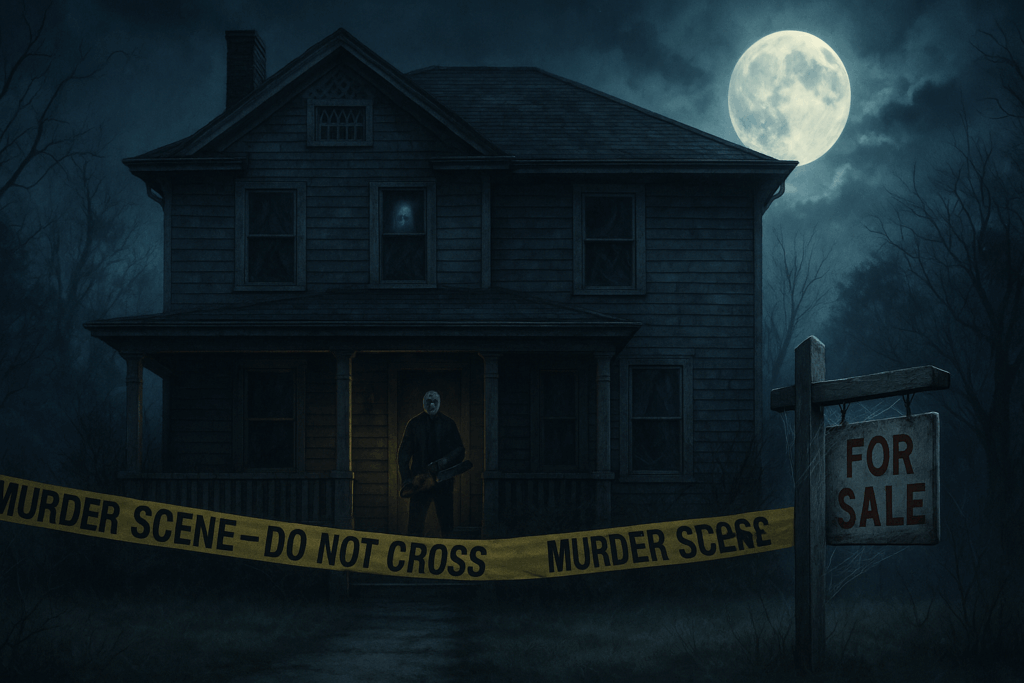
It’s that spooky time of year when ghosts, goblins, and Zillow alerts all show up at once. But if you’re selling a house in New Jersey that gives off Amityville vibes, you might be wondering: Do I have to tell buyers this place might be haunted?
The short answer: No, New Jersey doesn’t make you disclose ghosts.
The long answer: It depends who’s asking—and how you answer.
Let’s unpack the truth about haunted-house disclosures in the Garden State, where the only thing scarier than an apparition in the attic is a buyer with a lawyer.
🏠 What NJ Sellers Must Disclose
New Jersey law is clear about one thing: sellers must disclose all known material defects that affect the physical condition of the property.
That means the leaky roof, the cracked foundation, and the underground oil tank absolutely need to be mentioned. These are considered material facts, and failing to disclose them can land you in court faster than you can say “attorney review.”
If the “ghost” in your home is actually a black-mold problem or faulty wiring that flickers the lights, you must disclose it. But if the ghost is, well, just a ghost, the state isn’t concerned.
💀 Do You Have to Disclose a Murder or Death in the Home?
Here’s where buyers’ imaginations run wild.
In New Jersey, sellers are not automatically required to disclose that:
- Someone was murdered or died in the home
- A suicide occurred there
- The property is allegedly haunted
These are considered psychological stigmas, not physical defects. And under New Jersey law, stigmas don’t require disclosure.
So if your home’s biggest skeleton is metaphorical, you don’t have to volunteer that information.
But—if a buyer asks directly, you (and your agent) must answer truthfully to the best of your knowledge. Lie, and you could end up starring in your own legal horror story.
🧟♂️ A Real-World Example from My Own Files
Several years ago, I listed and sold a condo in Nutley that still stands out in my career.
The occupant had passed away, and tragically, his body wasn’t discovered for about two weeks. A neighbor first noticed something wasn’t right when the windows began filling with insects.
When authorities entered the unit, the damage was far worse than anyone expected. The smell was overwhelming, and contamination had spread through the flooring. A professional hazmat team had to be called in to remove the floors, sanitize the home, and certify it safe before it could even be photographed or shown to potential buyers.
Only after the cleanup, deodorization, and flooring replacement could the condo go on the market.
That experience taught me two things:
- Even difficult situations can be resolved with transparency and proper remediation.
- The difference between a “stigmatized property” and a saleable one often comes down to documentation and honesty.
The condo eventually sold without incident because everything had been professionally handled and disclosed properly. The story behind it could have scared people away, but by focusing on condition, facts, and certification, we kept the process grounded in reality—not rumor.
⚖️ The Legal Fine Print (Without the Cobwebs)
New Jersey’s stance can be summed up simply:
- Physical issues = Must disclose.
- Psychological issues = Optional, unless asked.
For example:
- If a buyer asks, “Has anyone ever died here?” you must answer honestly.
- If they never ask, you’re not obligated to bring it up.
- If a death caused a physical problem (such as contamination or damage), that issue must be disclosed and documented.
So while New Jersey doesn’t treat “haunted” as a material defect, any physical aftermath definitely qualifies.
🕯️ Why Buyers Still Care About Haunted Homes
Even if the law doesn’t require disclosure, buyer psychology is real. Some buyers don’t care if your house looks like the set of The Conjuring. Others will sprint for the exit if they sense bad energy—or bad headlines.
A 2024 Realtor.com survey found that nearly 40 percent of buyers would think twice before purchasing a home where a death or crime occurred.
So even when you’re not legally required to disclose, sometimes it’s wise to do so voluntarily—especially in the era of Google, Ring cameras, and Reddit neighborhood pages. Secrets don’t stay buried for long.
🧙♀️ Haunted-House Marketing: Trick or Opportunity?
Some sellers and agents lean into the haunted angle to attract attention. Across the country, “haunted” homes have drawn curious buyers and even investors who love a good story.
A Halloween-themed open house or a clever social-media hook can work if it’s tasteful and transparent. But for most sellers, it’s smarter to highlight what’s been repaired and updated. Ghosts don’t show up on inspection reports, but electrical issues do.
🧰 What to Do if Your Home Has a History
If your property has a complicated backstory—whether it involves a death, crime, or local legend—handle it carefully:
- Consult your agent first.
A knowledgeable agent can help frame the facts accurately without sensationalism. - Stick to verifiable information.
“A death occurred here in 2019” is factual. “The spirit still lingers” is not. - Document remediation.
If hazmat or restoration services were used, keep the reports and certifications. They help reassure buyers. - Be truthful when asked.
Honesty earns trust and protects you legally. - Emphasize improvements.
Fresh flooring, paint, and air-quality testing help shift attention from what happened to how the home now stands.
🕸️ When to Bring in an Expert
If the property’s past involves a death, crime scene cleanup, or environmental hazard, talk to both your real-estate attorney and your agent before listing.
They’ll advise what must be disclosed, how to document repairs, and whether it’s smarter to market quietly to cash buyers or investors who focus on value instead of emotion.
At NJ House Partners, I help homeowners across North Jersey sell all types of properties—probate, pre-foreclosure, distressed, or simply misunderstood. Every home has a story; my job is to tell it in a way that gets you sold, not spooked.
🎃 Final Thoughts: Honesty Is the Best Ghost Repellent
New Jersey’s disclosure laws give sellers flexibility when it comes to haunted or stigmatized homes. But the safest move is always truth backed by documentation.
A haunted house can be a challenge—or an opportunity. Either way, if you know the facts, tell the truth, and work with an agent who understands the legal fine print, you’ll keep the monsters where they belong—in Halloween movies, not in your attorney’s inbox.
Because in New Jersey real estate, the scariest thing isn’t a ghost in the attic.
It’s a deal that dies in attorney review.
👻 Need help selling a home with a history?
Whether your property has cobwebs, quirks, or questions, I can help you sell it safely, legally, and profitably.
📞 Kevin Hill – Keller Williams Valley Realty | NJ House Partners
Your North Jersey Agent for Real Homes, Real Challenges, Real Solutions.
📍 Woodcliff Lake, NJ | 201-214-1349
💻 NJHousePartners.com

